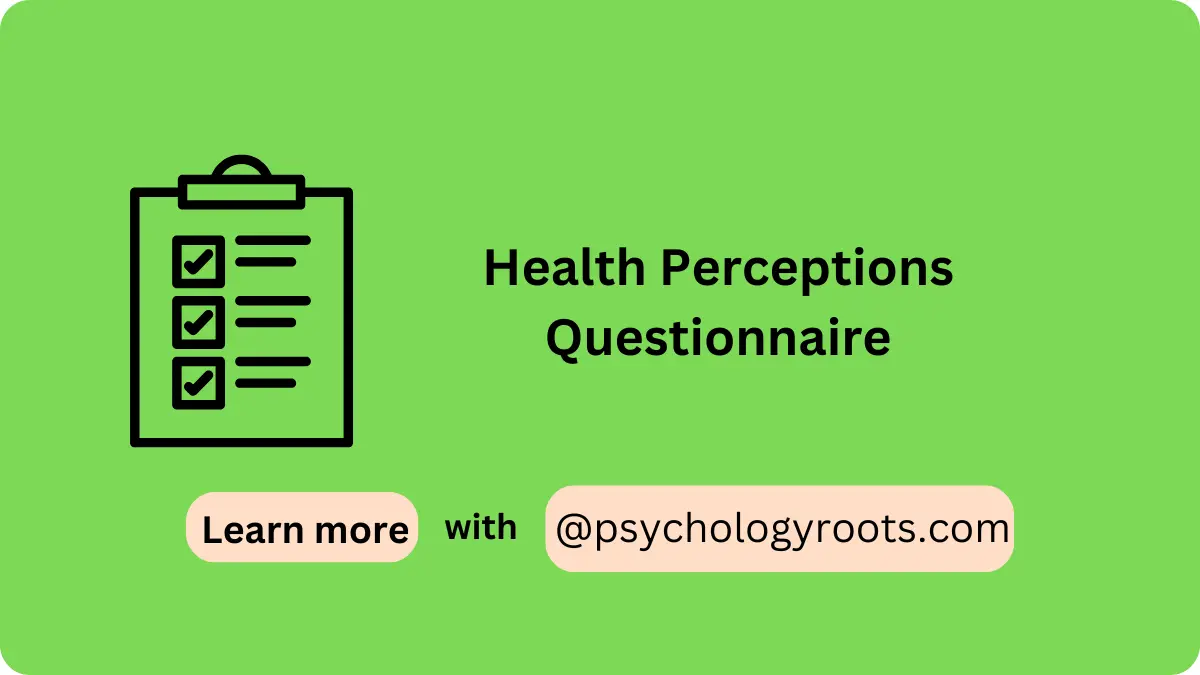Table of Contents
Health Perceptions Questionnaire
Here in this post, we are sharing the “Health Perceptions Questionnaire”. You can read psychometric and Author information. We have thousands of Scales and questionnaires in our collection (See Scales and Questionnaires). You can demand us any scale and questionnaires related to psychology through our community, and we will provide you with a short time. Keep visiting Psychology Roots.
About Health Perceptions Questionnaire
Scale Name
Health Perceptions Questionnaire
Author Details
John E. Ware
Translation Availability
English

Background/Description
The Health Perceptions Questionnaire (HPQ) was developed by John E. Ware in 1976 as a self-report instrument to measure subjective health perceptions rather than objective health status. Unlike traditional medical indicators that emphasize physical or mental conditions separately, the HPQ focuses on how individuals perceive their overall health, incorporating beliefs, expectations, and attitudes toward illness and wellness.
The HPQ was first employed in the RAND Health Insurance Experiment (HIE) as both an outcome measure and a predictor of healthcare utilization. Its conceptual foundation is grounded in the Health Belief Model, which posits that health-related behaviors are influenced by subjective perceptions of health rather than clinical assessments alone.
The questionnaire includes 33 items organized into six subscales:
- Current Health (9 items)
- Prior Health (3 items)
- Health Outlook (4 items)
- Resistance to Illness (4 items)
- Health Worry/Concern (5 items)
- Sickness Orientation (2 items)
Additionally, some items address rejection of the sick role and attitudes toward visiting physicians. From these, a General Health Rating Index (GHRI) can be calculated using 22 core items. Where time is limited, shortened versions using only 9 or 4 items are available.
By focusing on subjective health perceptions, the HPQ provides valuable insight into how individuals evaluate their well-being, often predicting healthcare use better than objective indicators.
Administration, Scoring and Interpretation
- Obtain a Copy: The HPQ is available through RAND publications and related academic resources.
- Explain the Purpose: Clarify that the questionnaire captures personal health perceptions, not medical diagnoses.
- Provide Instructions: Respondents complete 33 Likert-type items assessing current, past, and future health attitudes.
- Approximate Time: Takes 7–11 minutes to complete.
- Administer the Scale: Can be self-administered in surveys or completed in structured health research settings.
Reliability and Validity
The HPQ has been extensively tested in large population samples, showing robust psychometric properties:
- Internal Consistency: Median Cronbach’s alpha values typically range between 0.70 and 0.90 across subscales, supporting strong reliability.
- Test-Retest Reliability: Stability over time has been demonstrated, with coefficients ranging from 0.65 to 0.85 across multiple samples.
- Construct Validity: The HPQ correlates with measures of physical health, psychosocial well-being, and healthcare utilization.
- Predictive Validity: General health perceptions measured by the HPQ reliably predict use of health services, frequency of medical visits, and adoption of health behaviors.
- Factorial Validity: Factor analyses confirm the six-subscale structure, with correlations across dimensions supporting a higher-order construct of overall health perception.
Available Versions
33-Items
Reference
Ware Jr, J. E. (1976). Scales for measuring general health perceptions. Health services research, 11(4), 396.
WARE JR, J. E., DAVIES-AVERY, A. L. L. Y. S. O. N., & DONALD, C. A. (1978). vol. v, cENERAL HEALTH PERCEPToNs.
Important Link
Scale File:
Frequently Asked Questions
Q1. What does the Health Perceptions Questionnaire measure?
It measures subjective evaluations of health, including current, past, and future health, illness resistance, and health attitudes.
Q2. How is the HPQ different from medical health assessments?
Unlike objective measures, the HPQ captures personal beliefs and feelings about health, which often better predict healthcare use.
Q3. How long does it take to complete the HPQ?
It takes 7–11 minutes depending on the version used.
Q4. What populations can use the HPQ?
The HPQ is widely used in general population surveys, health outcome research, and behavioral health studies.
Disclaimer
Please note that Psychology Roots does not have the right to grant permission for the use of any psychological scales or assessments listed on its website. To use any scale or assessment, you must obtain permission directly from the author or translator of the tool. Psychology Roots provides information about various tools and their administration procedures, but it is your responsibility to obtain proper permissions before using any scale or assessment. If you need further information about an author’s contact details, please submit a query to the Psychology Roots team.
Help Us Improve This Article
Have you discovered an inaccuracy? We put out great effort to give accurate and scientifically trustworthy information to our readers. Please notify us if you discover any typographical or grammatical errors.
Make a comment. We acknowledge and appreciate your efforts.
Share With Us
If you have any scale or any material related to psychology kindly share it with us at psychologyroots@gmail.com. We help others on behalf of you.